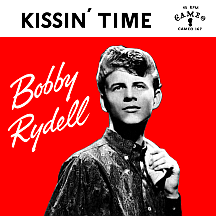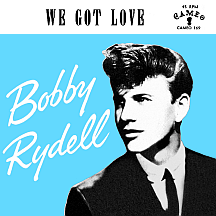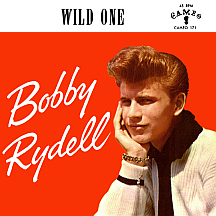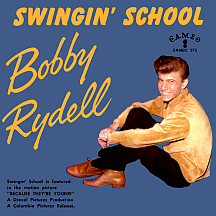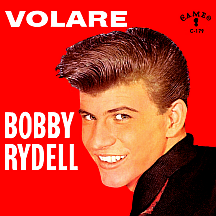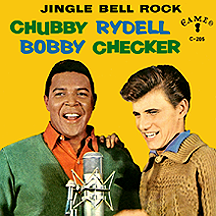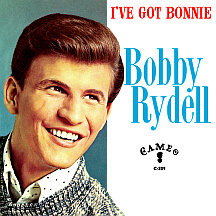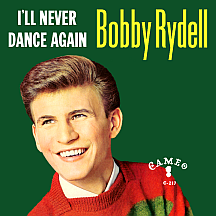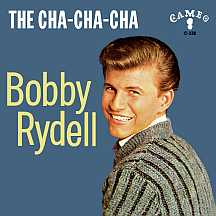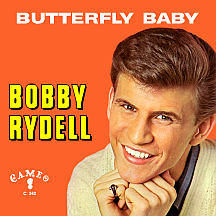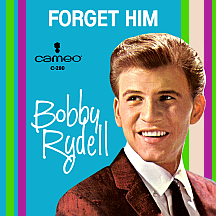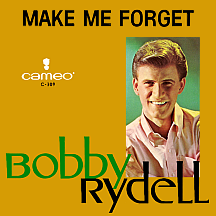BOBBY RYDELL
If shady dealings and tabloid-style gossip are the subjects that spark your curiosity, you've come to the wrong place. Few singers are less controversial or more clean-cut than Bobby Rydell. Then again, the Philadelphia-born teenager wasn't exactly alone when he burst onto the scene in 1959. Fabian Forte was also from Philadelphia and in his teens; other "nice young boys" came from near and far, including Frankie Ford, Carl Dobkins, Jr., Gary Stites, Bobby Vee and Rod Lauren, following where hitmaking heartthrobs Ricky Nelson, Paul Anka and another Philly kid, Frankie Avalon, none of them yet 20, had gone a year or two before. What a time it was for teenage (and pre-teen) girls!
Robert Ridarelli began playing drums around age five, his inspiration the great Gene Krupa. His first national exposure was on ABC's TV Teen Club, which had been hosted by superstar bandleader Paul Whiteman ("Pops" to millions of viewers) every Saturday night since 1949; the talent show, broadcast from Philadelphia, featured amateur performers in their teens or younger. Robert, nine years old in 1951, sat in with the band and was impressive enough that he appeared regularly for a couple of years; it was Whiteman who suggested Bobby Rydell as a stage name. By the time he was 14, he was drumming for a local band, Rocco and his Saints, which included another instrumentalist-turned-singer, trumpeter Frankie Avalon (whose recorded debut with the group in early 1957 was on Chancellor, a newly-formed hometown record label).
Rydell's debut disc was the one eyebrow-raising misfire in his otherwise squeaky-clean career. In 1958 the Saints' manager, Frankie Day, recorded him singing "Fatty Fatty," a truly bizarre, offensive song ('I got a gal who's kind of plump...three feet wide around the rump...') sung in an annoying falsetto (Avalon's early "nose-pinching" recordings seem serious by comparison) with a tuba played for "rotund" effect. Released on Day's Veko label, this affront to common sense was then released on another small label, Venise, and it's a stroke of good luck that it was widely ignored or Bobby's career might have gone off the rails then and there. The following year he signed a contract with Cameo-Parkway Records, headed by Kal Mann and Bernie Lowe who, fortunately, possessed far more common sense concerning good taste and marketability.
Mann and Lowe penned Rydell's first single for Cameo, "Please Don't Be Mad," a doo wop-style ballad, followed by a more pop-oriented love song, "All I Want is You," neither of them connecting despite the hot trend towards teen singers. The songwriting team took a different approach with the uptempo "Kissin' Time," featuring backing band Georgie Young and the Rockin' Bocs, with its shout-outs to various cities ('They're kissin' in Cleveland, Kansas City too...they're smoochin' all over, even in St. Lou...') and obvious mentions of recent hits (Johnny Horton's "The Battle of New Orleans," Connie Francis's "Lipstick on Your Collar" and "Kisses Sweeter Than Wine" by Jimmie Rodgers) in a blatant bid for commerical success. The single hit the charts in June and developed gradually over the summer; Dick Clark exposed the song on American Bandstand, Bobby lip-synced it on Clark's Saturday Beech-Nut Show and the record nearly made the top ten in September '59.
Major hits came nonstop for the next four years. The rock and roll teen formula seemingly couldn't miss, as most of his efforts were energetic, slickly-produced productions written mostly by Mann, Lowe and/or Dave Appell. "We Got Love" went top ten in November, followed by his biggest hit, "Wild One," number two in April '60 (behind the year's longest-running chart-topper, Percy Faith's "(Theme from) A Summer Place"). Bobby made his acting debut at this time in an episode of The Danny Thomas Show titled The Singing Delinquent, though he wasn't all that menacing; he sang "All of Me" (a hit in 1932 for Whiteman and Louis Armstrong in additon to several others through the years), revealing a propensity for standards that would soon become a large part of his live shows, particularly in venues like New York's Copacabana nightclub, where he secured an engagement the following year.
His next single, "Swingin' School" ('Chicks! Kicks! Cats! Cool!...Aaahh, schooool!'), scored that spring just ahead of summer vacation and was included in Because They're Young, Dick Clark's big screen acting debut. Fans couldn't get enough of Rydell and radio was accommodating; his flip sides ("I Dig Girls," "Little Bitty Girl" and "Ding-A-Ling") were hits as well. Bobby switched gears with "Volare," gambling on having a hit with a foreign language song that had been a number one smash for Italian crooner Domenico Modugno (as "Nel Blu Dipinto Di Blu") less than two years before and had been covered bilingually by Dean Martin, but Bobby's bright, infectious rendition (with mostly-English lyrics) proved irresistible and became his fourth straight top ten hit during the summer. Staying with the concept, he captured the spirit of the Pablo Beltran Ruiz-Norman Gimbel song "Sway" (a hit for Martin six years earlier). Rydell wrapped 1960 as one of music's top-selling acts.
Bobby missed the top ten completely in '61 but was a regular fixture in the top 40, scoring with the Mann-Lowe-Appell hits "Good Time Baby" and "I Wanna Thank You," another older standard, Harold Arlen and Johnny Mercer's "That Old Black Magic," and dance tune "The Fish," composed by Luther Dixon, Willie Denson and Jon Sheldon (its melody, oddly, a near note-for-note copy of Dixon and Denson's "Mama Said," a hit that year for The Shirelles). The record label teamed its two top stars, Rydell and Chubby Checker, on "Jingle Bell Rock," the 1958 Bobby Helms hit that, as it had done for Helms, sold well in successive holiday seasons.
Rydell's first hit of 1962, "I've Got Bonnie," came from the pens of Gerry Goffin and Carole King (who'd landed their first major hit, the Shirelles' "Will You Love Me Tomorrow," the previous year). "I'll Never Dance Again" used a more dramatic arrangement to fine effect, then Mann and Appell pulled the trick Dixon and company had done with "The Fish," only in the case of "The Cha-Cha-Cha," its melody lifted from Baby Cortez's summer '62 hit "Rinky Dink," the song was not entirely a creation of its credited writers but original artist Cortez (real name Dave Clowney). Bobby Rydell's image and methods were above reproach, but the same couldn't necessarily be said of the team creating his string of hits!
"Butterfly Baby" and "Wildwood Days" were hits in 1963, but as sales and airplay began to dwindle, Bobby pursued more acting roles, a second career his friend and former Saints bandmember Frankie Avalon embarked on when his records had begun to decline a couple of years earlier. A supporting (and singing) role in the high-profile musical film Bye Bye Birdie, based on the smash Broadway musical, paired him with star Ann-Margret on a couple of songs; the movie's success in theaters should have provided a solid start for Rydell as an actor, but things just didn't progress (ten weeks after the film's release, Avalon had better luck when he starred with Annette Funicello in Beach Party, the first in a series of box office hits). A TV pilot, Swingin' Together, was filmed, a musical comedy with Rydell as the lead (also starring James Dunn and Stefanie Powers), following the adventures of a band, "Bobby Day and his Four Knights," traveling from town to town on a tour bus. It was aired on CBS in August '63, but the network rejected it as an ongoing series.
Records continued selling respectably and one song connected in a big way; "Forget Him" (written by British songwriter and producer Tony Hatch using the pseudonym Mark Anthony) hit the top ten at year's end, overlapping The Beatles' chart-topping, British Invasion-igniting blast in January '64. Bobby's next single, "Make Me Forget," just missed the top 40 in April. His final chart appearance on Cameo was a cover of John Lennon and Paul McCartney's "A World Without Love." It hit the charts in May, the same week as Peter and Gordon's original version, which hit number one the following month, leaving Rydell in the dust. His Cameo contract at an end, he signed with Capitol Records, but only two low-charting singles resulted: a Goffin and King song, "I Just Can't Say Goodbye," in December '64 and a considerably slower-paced, inspired remake of Paul Anka's "Diana" in February '65.
A role in an October 1964 episode of the war series Combat! with Vic Morrow yielded a surprisingly good dramatic performance. Bobby's acting career never reached the level it could have, though he had a flair for comedy; a favorite of Red Skelton, he made several appearances on The Red Skelton Hour in addition to other variety series including The Jack Benny Program and the short-lived 1966 revival of The Milton Berle Show. Rydell made a few records for Reprise in 1968 and recorded for the RCA Victor and Perception labels in the 1970s with no luck. The mid-'70s success of contemporaries Paul Anka and Neil Sedaka encouraged Bobby to try again. Disco revivals of '50s hits ("Volare" by Al Martino and a new dancefloor version of "Venus" by Frankie Avalon) were popular, so Bobby took a shot with a disco remake of "Sway" on the Pickwick International Productions label, but he just didn't get the same results.
One nice distinction for the singer was the use of his name in the 1971 stage production of Grease, a hit on Broadway starting in '72 and a blockbuster film starring John Travolta and Olivia Newton-John in '78. Seems all the action took place at the fictional Rydell High School back in 1959, a nod to one of that year's breakout stars. Throughout his time as a singing sensation, Bobby Rydell had a high school sweetheart he kept hidden in plain sight. Camille Quattrone grew up in the same Philadelphia neighborhood; he asked her out shortly before "Kissin' Time" sent his career into orbit. They were both 17 years old and, at the urging of his manager, the relationship was kept secret lest he lose any female fans. If anyone asked who the girl often spotted with Bobby was, the answer was a simple, straightforward lie: she was his cousin! The couple finally married in 1968, a lifetime love affair interrupted by Camille's untimely death in 2003.
NOTABLE SINGLES:
- Fatty Fatty - 1958
- Please Don't Be Mad - 1958
- All I Want is You - 1959
- Kissin' Time /
You'll Never Tame Me - 1959 - We Got Love /
I Dig Girls - 1959 - Wild One /
Little Bitty Girl - 1960 - Swingin' School /
Ding-A-Ling - 1960 - Volare /
I'd Do it Again - 1960 - Sway /
Groovy Tonight - 1960 - Good Time Baby /
Cherie - 1961 - That Old Black Magic
Don't Be Afraid (To Fall in Love) - 1961 - The Fish - 1961
- The Door to Paradise /
I Wanna Thank You - 1961 - Jingle Bell Rock - 1961
by Bobby Rydell Chubby Checker / - Jingle Bells Imitations - 1961
by Bobby Rydell Chubby Checker - I've Got Bonnie /
Lose Her - 1962 - Teach Me to Twist - 1962
by Chubby Checker Bobby Rydell - I'll Never Dance Again /
Gee, It's Wonderful - 1962 - The Cha-Cha-Cha /
The Best Man Cried - 1962 - Butterfly Baby - 1963
- Wildwood Days /
Will You Be My Baby - 1963 - Let's Make Love Tonight - 1963
- Forget Him - 1963
- Make Me Forget - 1964
- A World Without Love - 1964
- I Just Can't Say Goodbye - 1964
- Diana - 1965
- Side Show - 1965
- The Lovin' Things - 1968
- The River is Wide - 1968
- It Must Be Love - 1970
- Sway (disco version) - 1976


